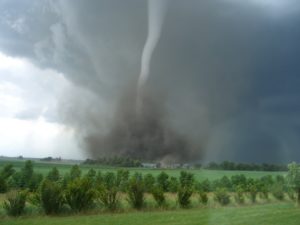
Meanwhile, a paper published yesterday in the prestigious journal Science, looks at data from the fifty years between 1950 and 2000 on ocean salinity patterns and reports the expression of “…an identifiable fingerprint of an intensifying water cycle.” What does that mean? The NY Times article on the paper says the findings in the paper imply “…that the water cycle could quicken by as much as 20 percent later in this century as the planet warms, potentially leading to more droughts and floods.” An accompanying article in the same issue of Science is titled The Greenhouse Is Making the Water-Poor Even Poorer. Here’s the bottom line on the science: “Theory and models predict that a strengthening greenhouse will increase precipitation where it is already relatively high and decrease it where it is already low. A new study of the ocean’s changing salinity …confirms that this mechanism of water-cycle amplification has been operating for the past half-century.”
The science is, yet again, being proven by extensive data. The Intergovernmental Panel on Climate Change issued preliminary findings from its Special Report for Managing the Risks of Extreme Events and Disasters to Advance Climate Change Adaptation (SREX) last fall. I reported here at the time that the report “…enumerates a number of key themes, including that climate extremes have been well documented, along with various kinds of attendant weather anomalies, and that these are going to get worse.” (See this video from the SREX.)
One further note: The apparently beautifully prepared documentary series running now, Frozen Planet, is devoted to a comprehensive look at conditions in the Arctic and Antarctic. It explores the wildlife, the people and the increasingly difficult conditions relative to warming that they are experiencing. However, the series seems to studiously avoid the obvious factor of climate change in producing these dire effects for the denizens of the Earth’s poles and, for that matter, for the whole planet. This article from the NY Times last week, No Place for Heated Opinions, quotes Anthony Leiserowitz of Yale: “Many organizations, and it sounds like Discovery is one of them, appear to be more afraid of being criticized by climate change ‘dismissives’ than they are willing to provide information about climate change to the large majority of Americans who want to know more about it.” Bill McKibben, of 350.org, had an even more stringent take: “It’s kind of like doing a powerful documentary about lung cancer and leaving out the part about the cigarettes.” Ouch.